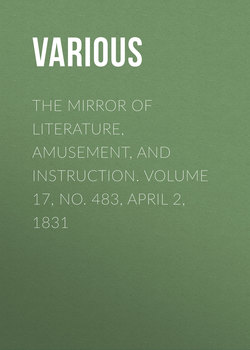Читать книгу The Mirror of Literature, Amusement, and Instruction. Volume 17, No. 483, April 2, 1831 - Various - Страница 3
THE NOVELIST
ОглавлениеTHE GAMESTER’S DAUGHTER
From the Confessions of an Ambitious Student
A fit, one bright spring morning, came over me—a fit of poetry. From that time the disorder increased, for I indulged it; and though such of my performances as have been seen by friendly eyes have been looked upon as mediocre enough, I still believe, that if ever I could win a lasting reputation, it would be through that channel. Love usually accompanies poetry, and, in my case, there was no exception to the rule.
“There was a slender, but pleasant brook, about two miles from our house, to which one or two of us were accustomed, in the summer days, to repair to bathe and saunter away our leisure hours. To this favourite spot I one day went alone, and crossing a field which led to the brook, I encountered two ladies, with one of whom, having met her at some house in the neighbourhood, I had a slight acquaintance. We stopped to speak to each other, and I saw the face of her companion. Alas! were I to live ten thousand lives, there would never be a moment in which I could be alone—nor sleeping, and that face not with me!
“My acquaintance introduced us to each other. I walked home with them to the house of Miss D–(so was the strange, who was also the younger lady named.) The next day I called upon her; the acquaintance thus commenced did not droop; and, notwithstanding our youth—for Lucy D– was only seventeen, and I nearly a year younger—we soon loved, and with a love, which, full of poesy and dreaming, as from our age it necessarily must have been, was not less durable, nor less heart-felt, than if it had arisen from the deeper and more earthly sources in which later life only hoards its affections.
“Oh, God! how little did I think of what our young folly entailed upon us! We delivered ourselves up to the dictates of our hearts, and forgot that there was a future. Neither of us had any ulterior design; we did not think—poor children that we were—of marriage, and settlements, and consent of relations. We touched each other’s hands, and were happy; we read poetry together—and when we lifted up our eyes from the page, those eyes met, and we did not know why our hearts beat so violently; and at length, when we spake of love, and when we called each other Lucy and –; when we described all that we had thought in absence—and all we had felt when present—when we sat with our hands locked each in each—and at last, growing bolder, when in the still and quiet loneliness of a summer twilight we exchanged our first kiss, we did not dream that the world forbade what seemed to us so natural; nor—feeling in our own hearts the impossibility of change—did we ever ask whether this sweet and mystic state of existence was to last for ever!
“Lucy was an only child; her father was a man of wretched character. A profligate, a gambler—ruined alike in fortune, hope, and reputation, he was yet her only guardian and protector. The village in which we both resided was near London; there Mr. D– had a small cottage, where he left his daughter and his slender establishment for days, and sometimes for weeks together, while he was engaged in equivocal speculations—giving no address, and engaged in no professional mode of life. Lucy’s mother had died long since, of a broken heart—(that fate, too, was afterwards her daughter’s)—so that this poor girl was literally without a monitor or a friend, save her own innocence—and, alas! innocence is but a poor substitute for experience. The lady with whom I had met her had known her mother, and she felt compassion for the child. She saw her constantly, and sometimes took her to her own house, whenever she was in the neighbourhood; but that was not often, and only for a few days at a time. Her excepted, Lucy had no female friend.
“One evening we were to meet at a sequestered and lonely part of the brook’s course, a spot which was our usual rendezvous. I waited considerably beyond the time appointed, and was just going sorrowfully away when she appeared. As she approached, I saw that she was in tears—and she could not for several moments speak for weeping. At length I learned that her father had just returned home, after a long absence—that he had announced his intention of immediately quitting their present home and going to a distant part of the country, or—perhaps even abroad.
